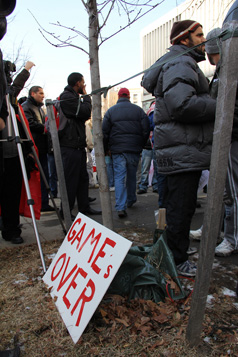The Tunisian uprising that overthrew the 23-year-old regime of strongman Zine el-Abidine Ben Ali had resonances throughout the Middle East. Leaders of countries invested in the region’s authoritarian and highly unequal status quo rejected the political revolution, while groups and states that want change welcomed it. The spectacle of masses of demonstrators pouring down Avenue Bourguiba in Tunis on Friday, overwhelming security forces and putting the president to flight, raised the hopes of the dispossessed and the downtrodden, even as it inspired a gathering dread in the breasts of the region’s dictators and absolute monarchs. Whether or not, as many observers rushed to predict, a wave of discontent will radiate from Tunis throughout the Arab world (and there are reasons to be cautious about that prospect), the “Jasmine Revolution” is a Rorschach test for distinguishing reactionaries from innovators in the region.
Israeli Deputy Prime Minister Silvan Shalom worried that the Tunisian events might lead to regime change in other countries. Originally from Tunisia himself, Shalom expressed disquiet that a more democratic Middle East might not share with Tel Aviv a concern with fighting what he called radical fundamentalists, who he said threaten Israel. He was probably talking about the possibility of, say, the Muslim Brotherhood taking over Egypt or Jordan, both of which have peace treaties with Israel that are likely be abrogated if another government comes to power. It is hypocritical, however, for the Israelis, who are always criticizing the Arab world for being undemocratic, to express such anxiety about the prospect of democratization.
Among the more forthright condemnations in the Arab world of the crowd action ironically came from an old revolutionary and populist, Libyan dictator Moammar Gadhafi. An ally of Ben Ali, Gadhafi insisted that the dictator was still the country’s legal president, and was the best person to rule it. He upbraided his Tunisian neighbors for their impatience, since Ben Ali had anyway Thursday pledged to step down in 2014. All the Tunisians had accomplished, he lamented, was to trade out one known president for an unknown one. He also denounced as fabrications the U.S. cables revealed by WikiLeaks that detailed Ben Ali’s corruption. (A WikiLeaks cable had reported on Gadhafi’s own foibles, including his voluptuous, ever-present Ukrainian nurse.)
The quirky Libyan leader’s cautions were clearly aimed as much at his own people as at Tunis. Although Gadhafi rules brutally, he has been better than other rulers of oil states about sharing the wealth (a notion Ben Ali appears never to have heard of). It is not clear that Libyans, recently able to export and develop their petroleum after years of international boycotts over alleged terrorist acts emanating from their government, want to rock the boat. The only recent major protests in Libya have been by the poor over delays in completing the construction of government-funded housing.
In Jordan, the protests have been more substantive and broadly based. After a big rally condemning unemployment and high food prices Friday, some 3,000 trade unionists, leftists and Muslim fundamentalists staged a protest outside the parliament building in Amman on Sunday. They demanded that Prime Minister Samir Rifai step down in favor of a leader closer to the people, and speakers warmly congratulated the Tunisian people on their victory.
In Iraq, Arab inhabitants of the Kurdish-dominated province of Kirkuk threatened to mount a Tunisian-style uprising against Kurdish security forces and the Kurdish-dominated police. The ethnic super-province of Kurdistan, dominated by the Kurdish ethnic group, which does not speak Arabic, is attempting to annex Kirkuk to itself, alarming Iraqi Arabs who live there and feel they would face discrimination under such a circumstance.
The Lebanese Shiite party-militia, Hezbollah, expressed its pride in what the Tunisians had accomplished, and compared the Tunisian events to the 1978-79 revolution in Iran. Iran, itself shaken by its own popular uprising in summer 2009, has been more measured in its comments. Both Syria and Iran blamed Ben Ali’s troubles on his overly cozy relationship with a fickle United States.
Every state and movement in the Middle East is reading into the events in Tunisia its own anxieties and aspirations. Powerful states facing opposition such as Libya and Israel were unnerved, and the Tunisians have done us the favor of allowing us to see the similarities between Tripoli and Tel Aviv in this regard. Both appear to feel themselves under siege by rapid and unwelcome change in the region. Oppressed minorities, such as Arabs in Kurdish-dominated areas of Iraq, took heart from the Tunisian achievement. Those movements challenging the status quo, whether Hezbollah in Lebanon or leftists and Muslim fundamentalists in Jordan, were the most vocal in congratulating Tunisia and associating themselves with its achievement. The status quo states afraid of change, including Libya and Israel, have powerful allies in the West and substantial monetary resources. The odds are stacked against people power of the Tunisian sort.
Join us in defending the truth before it’s too late
The future of independent journalism is uncertain, and the consequences of losing it are too grave to ignore. To ensure Truthout remains safe, strong, and free, we need to raise $43,000 in the next 6 days. Every dollar raised goes directly toward the costs of producing news you can trust.
Please give what you can — because by supporting us with a tax-deductible donation, you’re not just preserving a source of news, you’re helping to safeguard what’s left of our democracy.
